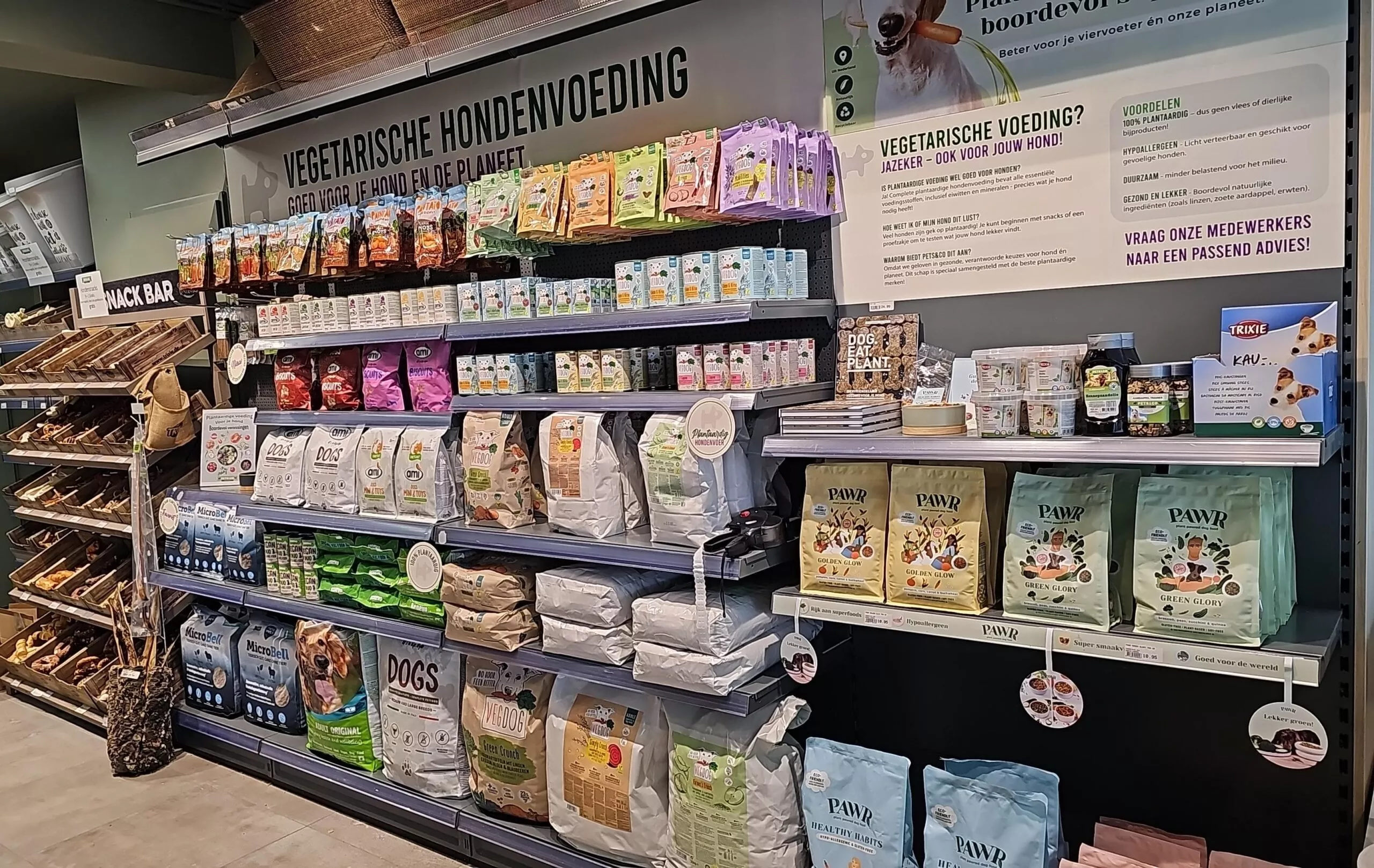Home / The Key To A Healthy And Happy Dog 7 Simple Ways To Improve Gut Health

The Key to a Healthy and Happy Dog: 7 Simple Ways to Improve Gut Health
08/04/2025
6 minutes
Introduction: Why Your Dog’s Gut Microbiome Matters
Your dog’s gut microbiome plays a crucial role in overall health, affecting digestion, immunity, and even behavior. A well-balanced microbiome supports nutrient absorption, reduces inflammation, and strengthens the immune system. While factors like diet, antibiotics, and stress can influence gut health, the good news is that small, natural adjustments can help maintain a thriving gut microbiome.
In this article, we explore simple, science-backed ways to promote gut health and enhance your dog’s overall well-being.
What is the Gut Microbiome?
Your dog’s gut is home to trillions of microorganisms, including bacteria, fungi, and viruses, collectively known as the gut microbiome. This complex ecosystem is essential for:
✔ Efficient digestion
✔ Nutrient absorption
✔ A strong immune system
✔ Reducing inflammation
✔ Supporting mental well-being
An imbalanced microbiome (dysbiosis) may contribute to digestive discomfort, allergies, skin sensitivities, and lowered immunity. Fortunately, there are natural ways to maintain a healthy gut environment for your dog.
1. Incorporate Fresh Whole Foods
Most commercial pet foods provide essential nutrients, but many ultra-processed diets have been linked to reduced microbial diversity. Including fresh, whole foods can play a crucial role in restoring gut balance, improving digestion, and supporting long-term health.
Consider incorporating:
✔ Fresh vegetables and fruits (carrots, pumpkin, apples, blueberries)
✔ Healthy plant-based proteins (lentils, tofu)
✔ Whole grains (oats, quinoa, brown rice) for fiber and prebiotics
Scientific studies suggest that including fresh foods in a dog’s diet can promote microbial diversity, which is linked to overall health and longevity.
2. Boost Fiber and Prebiotics
Prebiotics are fibers that nourish beneficial gut bacteria, helping them thrive.
Great sources of prebiotics include:
✔ Pumpkin (aids digestion and feeds good bacteria)
✔ Bananas (rich in inulin, a natural prebiotic)
✔ Chicory root (one of the best prebiotic sources)
✔ Sweet potatoes (high in fiber and antioxidants)
✔ Flaxseeds (support digestion and provide omega-3s)
Adding fiber-rich foods to your dog’s diet can naturally support gut balance and digestion.
3. Include Probiotic-Rich Foods
Probiotics are beneficial bacteria that contribute to a well-functioning microbiome. Instead of relying solely on supplements, you can introduce natural probiotic foods:
✔ Fermented vegetables (sauerkraut, fermented carrots—unsalted, without onions or spices)
✔ Unsweetened coconut yogurt (a great dairy-free probiotic source)
✔ Tempeh (fermented soy, high in probiotics and protein)
✔ Miso (a small amount can offer probiotic benefits)
These foods help introduce and maintain a healthy balance of gut bacteria, supporting digestion and immune function.
4. Choose Wholesome, Natural Ingredients
Selecting high-quality food with natural ingredients can positively impact your dog’s gut health. A well-balanced diet, whether it includes kibble, wet food, or fresh meals, should prioritize high-quality proteins, whole-food ingredients, and essential nutrients.
To support optimal gut function, consider:
✔ Choosing foods with natural, minimally processed ingredients
✔ Offering high-quality protein sources
✔ Avoiding excessive artificial additives
✔ Providing fiber-rich options for prebiotic support
Every dog is unique, so finding the right balance for your pet is key to maintaining long-term health.
5. Encourage Outdoor Exploration
Time spent outdoors isn’t just great for exercise—it also benefits gut health. Studies show that dogs exposed to diverse natural environments tend to have more varied and resilient microbiomes.
✔ Let your dog explore and sniff during walks
✔ Encourage safe digging and rolling in the soil
✔ Visit parks, forests, or beaches for exposure to natural microbes
✔ Allow dogs to nibble on safe grasses (many dogs instinctively do this for digestion)
A varied environment enriches microbial diversity, which supports overall health and immunity.
6. Manage Stress for Gut Health
Stress and anxiety can directly impact gut health, leading to imbalances in beneficial bacteria. Maintaining a calm, enriching environment can help prevent stress-related digestive issues.
✔ Keep a consistent daily routine
✔ Provide mental stimulation with puzzle toys, training, and scent games
✔ Use positive reinforcement techniques
✔ Reduce loud noises and sudden disruptions at home
✔ Consider calming herbs like chamomile or valerian root (under professional guidance)
Reducing stress contributes to a well-balanced gut-brain connection, promoting both mental and physical well-being.
7. Keep Your Dog Hydrated
Proper hydration supports digestion and gut function. Ensure your dog has access to fresh water at all times.
✔ Always provide clean, fresh water
✔ Include hydrating foods like cucumber, watermelon, or broth
✔ Offer homemade bone or vegetable broth for extra gut support
Hydration plays a crucial role in maintaining a well-functioning digestive system and promoting optimal nutrient absorption.
Conclusion: A Healthy Gut for a Happier Dog
Supporting your dog’s gut microbiome doesn’t have to be complicated. Simple adjustments, such as incorporating fresh foods, increasing fiber, providing probiotics, choosing high-quality ingredients, and reducing stress, can significantly enhance digestion, immunity, and overall vitality.
Start with small changes—try adding one gut-friendly food at a time and observe the benefits in your dog’s energy, coat, and digestion.
Do you already include gut-boosting foods in your dog’s diet? Share your experience in the comments below!
About Claire Lucie
UK-Trained Canine Nutritionist | Founder of Blacky’s Kitchen, Yuska Company & Claire The Dog Nutritionist
Visit www.clairethedognutritionist.com for free resources, consultations, recipes, and expert insights on canine nutrition.
📸 Instagram: @clairethedognutritionist
📧 Contact: [email protected]
Disclaimer
This article is for informational purposes only and is not a substitute for professional veterinary advice. Always consult a veterinarian before making dietary changes for your dog.
References
Axelsson et al., 2013 – Study on the AMY2B gene in dogs, showing their adaptation to digest starch and fiber, which influences gut microbiome diversity.
Deng et al., 2013 – Research on how dietary fiber improves gut microbiota composition in dogs.
Schmidt et al., 2018 – Study on how highly processed kibble reduces microbial diversity, while fresh whole-food diets promote a healthier gut microbiome.
Pilla & Suchodolski, 2020 – Overview of the gut microbiome’s role in immunity and disease prevention in dogs.
de Godoy et al., 2013 – Research on the benefits of prebiotic fiber (chicory root, inulin, and fructooligosaccharides) in improving gut health in dogs.
Tun et al., 2017 – Study on how fermented foods introduce beneficial probiotics and enhance gut health in dogs.
Sandri et al., 2017 – Study showing how a fresh diet improves gut microbiota composition compared to kibble.
Gagné et al., 2018 – Research linking ultra-processed pet food to increased gut inflammation and metabolic disorders.
de Wilde et al., 2019 – Study on how advanced glycation end-products (AGEs) from ultra-processed foods contribute to inflammation and disease.
O’Callaghan et al., 2016 – Evidence on stress altering gut microbiota, impacting digestion and immune function in animals.
Le Chatelier et al., 2013 – Study on microbial diversity and metabolic health, showing that a diverse gut microbiome is linked to improved overall health in mammals.
Barko et al., 2018 – Comprehensive review of how gut microbiota influence canine metabolic health and disease prevention.
Kerr et al., 2013 – Study on how hydration and dietary water intake affect gut motility and microbiome health.
Li et al., 2017 – Research showing that dogs exposed to natural environments have greater microbial diversity compared to those in urban settings.









